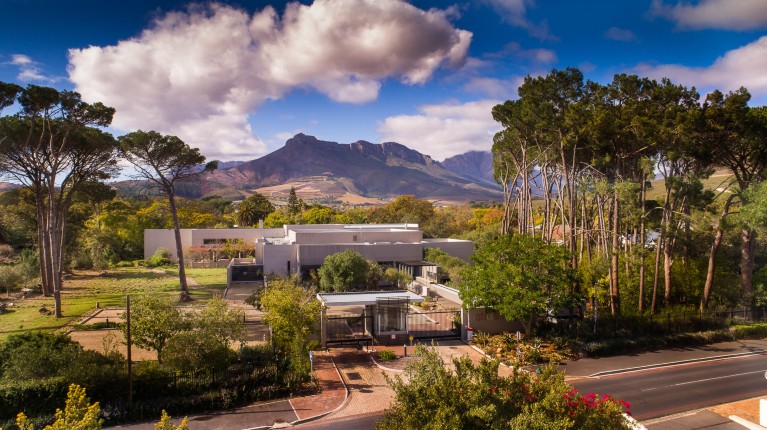
The Stellenbosch Institute for Advanced StudyCredit: Anton Jordaan/SCPS
Lire en français
The world’s Institutes of Advanced Study (IAS) enable leading scientists to concentrate fully on their research. The first institute for advanced study in Africa, the Stellenbosch Institute of Advanced Study (STIAS), was established 25 years ago in South Africa. STIAS hosts the only Nobel symposia outside Scandinavia, as well as 30-35 Fellows per semester, from diverse career stages, genders, geographical and cultural backgrounds, and an exceptional range of disciplines. The Fellows’ obligations are few: a daily joint lunch, a seminar, and an hour of extensive Q&A after each seminar. The remaining time is free for individual deep thinking and research, away from home institutions and funders.
Many of the 2024 cohort at STIAS have used their time there to achieve breakthroughs of their own in diverse disciplines, which are now appearing in journals. They cover topics as diverse as the sociology of fishery songs from Ghana, new aspects of African harbour history, molecular networks driving hair growth, and the environmental fate of pesticides.
One could think that these advances could just as well have been achieved with the Fellows staying at their home institutions or at any of the other IAS of this world. What, then, is the added value of the Stellenbosch IAS for science? And what is in it for Africa and the world at large?
We are a group of 19 Fellows from the first 2024 STIAS cohort (together nick-named ‘the STIAS-2024 bunch’) and we aim to describe what emerged during our experience at the STIAS beyond ‘science as usual’. We found that the added value of the Stellenbosch IAS is a new attitude to science, one that leads to new joint insights on challenges that science and humanity face, based on scientific data.
This gradual shift in our mindsets at STIAS included a wider definition of science as ‘systematic fact-based meaning-making’. This definition of science includes the humanities, the natural and the social sciences, as well as engineering and many of the arts. Rather than remaining in the comfort zone of our own single expertise, we solicited contributions from all disciplines and also examined locally informed minority views of prospective users of scientific results.
This new attitude aligns with the African Ubuntu philosophy1 associated with Nelson Mandela and Desmond Tutu. This emphasizes that human individuals are shaped through constructive relationships with other human individuals. Mandela and Tutu implemented Ubuntu in the Truth and Reconciliation committees, which enabled a peaceful transition into a democratic South Africa. This Ubuntu philosophy challenges the idea of individualistic science and adds to it a dimension of common responsibility. Ubuntu science should be at least as factual, falsifiable, fair, accessible, interoperable, rational, reusable and reproducible as ‘Western’ science. An existing example in Western Science that already tends towards Ubuntu science is systems biology, that made cell biology more factual, falsifiable, and reproducible when it added mathematical modelling, physics and chemistry to microscopy and molecular biology.
These ubuntu-science attitudes differ from the ultra-competitive mainstream of today’s academia2. Yet, we found that Ubuntu science may produce better scientific insights through Ubuntu’s appreciation of complexity, multiple and relayed factoriality, integration, and beneficial coexistence – concepts that are relevant for virtually all sciences. Think of entanglement in particle physics, complex molecular pathways in biology, how genes and the environment interact to cause diseases, how the concept of evolution can be applied to technology, art and politics, of how various immune cell types manage the delicate balance between immunity and autoimmunity together, of how early humans in Southern Africa migrated and developed technological and cultural adaptations that we still benefit from.
Providing top scientists with ‘creative space for the mind’ has resulted in an Ubuntu debate mode that introduced a cross-disciplinary thinking that is rare in today’s academic environments and can result in new, constructive, solution-oriented, scientific ideas. This is how STIAS can contribute to science in Africa and the rest of the world.
